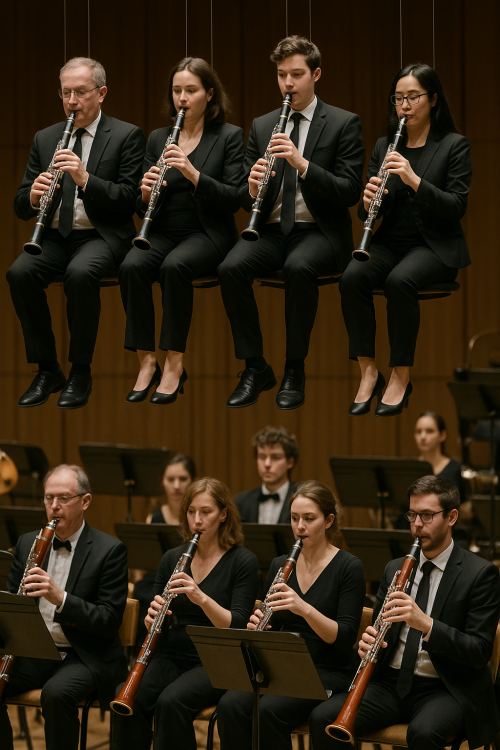All Activity
- Today
-
The Echos of Flame - Work in progress
NicholasG replied to NicholasG's topic in Orchestral and Large Ensemble
That is actually what i planned on doing with that melody! -
PeterthePapercomPoser started following String quartet #1 - 3rd and last movement and Winter Road Drive
-
EmotionallyChargedMusic started following Winter Road Drive
-
This is a scene where the main characters were racing against a winter storm blizzard
-
Marc Deflin started following String quartet #1 - 3rd and last movement
-
Hi 🙂 Here's the third and last movement of my first complete string quartet. It's a moderato which starts quietly in the main D Major tone, before modulating in its first theme to a strong A Major viola-leaded melody. Then both main themes from the first and second movements are sequentially reexposed. Follows a happy interlude in D major. Whereafter first theme comes back and developments bring us slightly as a conclusion to the final exposure of the principal theme of this string quartet (the one from the adagio), first hinted at in the background by the viola. Thanks for listening ! 🙂 Regards, Marc
-
Frank Normandy started following What Is Your Current Musical Project?
-
What Is Your Current Musical Project?
Frank Normandy replied to AngelCityOutlaw's topic in Composers' Headquarters
Right now, I’m readying my music project workspace in my computer’s hard drive for my eventual migration from Finale to Musescore and Dorico, e.g. creating MusicXML files. Also, even though burned out, I’m trying very hard to finish my Fantasy Reflections 2nd track for violin and piano. Lastly, I have rough piano sketches for some pop ballads right now, being enamored by my really guilty J-pop phase these past 12 months. Although melodies and colorful chords progressions come relatively easily to me for these pop songs, I’m still doing early research and brushing up on drum patterns, lyrics, and pop instrumentation. Some advice for me is appreciated! ~Frank -
Piano Concerto
Frank Normandy replied to Valerio DallaRagione's topic in Orchestral and Large Ensemble
Hello @Valerio DallaRagione, Welcome here! I only listened to the very opening of your piano concerto, but I already felt mystical, trance-like, Egyptian vibes. You sure do seem like a really ambitious composer, and it really shows. Keep it up! ~Frank - Yesterday
-
Henry Ng Tsz Kiu started following How Far Can Our Hearts Go?
-
PeterthePapercomPoser started following How Far Can Our Hearts Go?
-
famedstingray59 joined the community
-
https://drive.google.com/file/d/1w-SmNpUhq5RHh-KawOARjjFUxGxphvy5/view?usp=sharing
-
The Echos of Flame - Work in progress
Marius_ replied to NicholasG's topic in Orchestral and Large Ensemble
Also when the brass is playing the melody I would try to harmonise it. That'll make it sound more 'full'. Although that is also a neat card to only pull later on in the piece, if that melody returns. This also goes for woodwinds, but it is less important there, cause of the different textures the instruments have; when they are playing in unison it'll probably sound more varied already. Brass sounds really epic but also kinda like a sine wave imo... Especially when they are a bit pitchy -
Marius_ started following The Echos of Flame - Work in progress
-
The Echos of Flame - Work in progress
Marius_ replied to NicholasG's topic in Orchestral and Large Ensemble
Alternative option not bad either. Those things below are supposedly bassoons... Your piece sounds really cool. I'd love to hear it when it is finished 🙂 -
The one month may be a bit biased as my brother (11) already played Sibelius and Tchaikovsky violin concertos (albeit not perfect), Carmen Fantasy, Erlkonig, and God Save the King Paganini variations among some other pieces. But the cellist I wrote for got scared with double and triple stops (to be fair some of them were a little overboard and that was before learning enough harmony to do so)
-

The Echos of Flame - Work in progress
Henry Ng Tsz Kiu replied to NicholasG's topic in Orchestral and Large Ensemble
Yeah 😅 -
The Echos of Flame - Work in progress
NicholasG replied to NicholasG's topic in Orchestral and Large Ensemble
OHH you meant the score order -
The Echos of Flame - Work in progress
NicholasG replied to NicholasG's topic in Orchestral and Large Ensemble
oh lol nvm then -
probably a bit hard to sightread, (internal complaints start after 4 accidentals keys for most players), but I don't think its too bad to be performed with a month of rehearsal. Good players might only need a week. The counterpoint sections will probably be the hardest to rehearse. Although probably be a bit awkward like most barque pieces. (not to judge, but most barque pieces don't fit the modern instrument as well as pieces from latter periods). Also probably not qualified to judge on the counterpoint
-

The Echos of Flame - Work in progress
Henry Ng Tsz Kiu replied to NicholasG's topic in Orchestral and Large Ensemble
I'm wrong LoL, this one is a band score rather than an orchestral one. - Last week
-
But you don't only have the viola part follows the piano here, you have the piano playing all 4 parts of the String Quartet which in a way writes like a piano accompaniment to a choir which is common practice there but certainly not a good one here since piano shouldn't be considered an accompaniment in a Piano Quintet. The piano part has its own right to play its own parts, rather only repeating the strings. But ofc if I'm the pianist I would be happy to play it since it would be easy to play with. I 'thing' that having cello plucked would be a nice variation to its part. Remember to hit the like button on the bottom right corner as well so that the reviewer knows that you like their posts. Thx.
-
PeterthePapercomPoser started following The Bitter End
-
I was originally going for a piano quartet (no viola) since I was thinking of having some people perform it, but then one of the violinists stepped up to play viola. Thats why the viola part follows the piano. An extra question: what do you thing about having the cello part plucked for the outer sections
-
Emalyn C. joined the community
-
The Echos of Flame - Work in progress
NicholasG replied to NicholasG's topic in Orchestral and Large Ensemble
ooo maybe -
First piano music composition "The Bitter End" inspired by Akira Yamoka's music An emotionally distressed suicidal woman on the brink of insanity. She begins seeing grotesque monsters manifesting out of her trauma. In shadows deep, her mind unwinds, A fractured heart, a soul confined. Edge of silence, whispers scream, Drowning slow in fractured dreams. Yet through the void, a flicker small, A trembling, fragile, hopeful call. A light so faint, yet softly burns— A chance to rise as darkness turns. The music starts with impending doom and then the piano starts playing and it symbolizes the player begins panicking running escaping from the impending doom as monsters chase.
-
EmotionallyChargedMusic joined the community
-

What Is Your Current Musical Project?
AngelCityOutlaw replied to AngelCityOutlaw's topic in Composers' Headquarters
Nice -
Thx! Yeah I do put a lot of effort in this one I have to admit, im order to speak out things I wanna speak long ago. I do hope to write something more unique as I actually never know what my style is! Thx! The philosophical thinking lingers in my mind at least 10 years I believe when I was reading the Chinese Philosophy Classics, and also guided by my Philosophy Professor who is a student of the Grandmasters of New Confucian School, Tang Chun I and Mou Zhongsan. I may not really know their philosophical thoughts, but always feel myself inspired after reading their works, just like after reading listening to a great piece of music or reading great literature. I just try to write what I feel towards Tao here, plus my own experience. I think it will be very difficult to have it recorded or even performed, so now I don’t have the plan. I know the work can be difficult to play, and it’s too long to be performed, as groups now only prefer much shorter works to perform. Henry
-
Hi @Chemathmusician0510, I agree with @danishali903, the piano shouldn’t just repeat what the strings are playing, but instead have its own part. I wouldn’t go as far as calling the music basic since I think it does display some good chamber music part writing and counterpoint, but I may add more interaction between the instruments and allow other instruments to play the melodic role as well. The piece sounds quite Baroque for me even with those dissonance, because of the drive of the outer sections and the Trio sonata slow movement like middle section. Thx for sharing! Henry
-

The Echos of Flame - Work in progress
Henry Ng Tsz Kiu replied to NicholasG's topic in Orchestral and Large Ensemble
Hi @NicholasG, I like the vibe in it. Maybe one thing is that the clarinet section should be placed above the bassoons? Thx for sharing. Henry -

The End of Things - Suite (WIP)
Henry Ng Tsz Kiu replied to Layne's topic in Orchestral and Large Ensemble
Hi @Layne! I like the beginning augmented chords. Then starts from 0:50 it starts to sound like a film trailer with those chasing rhythm underneath. I feel like the abrupt start of the chorale melody in 1:47 a bit abrupt for me, maybe add a transition between the two passages? The ending does sounds sinister again with the augmented chords and that dissonant ending. Thx for sharing! Henry





